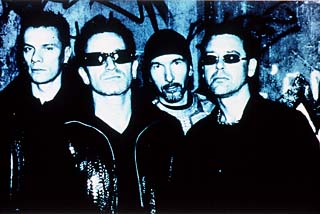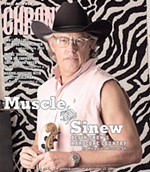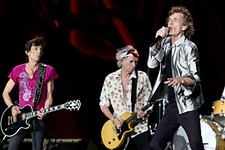In God's Country
U2 and All That You Can't Leave Behind
By Christopher Gray, Fri., March 30, 2001

"Call to me and I will answer you and tell you great and unsearchable things you do not know" -- Jeremiah 33:3, Bible verse referenced on the cover of U2's All That You Can't Leave Behind
"You don't know what you're doing -- babe, it must be art" -- "Hold Me Thrill Me Kiss Me Kill Me"
Fly shades aside, U2's greatest impact on popular music and the culture that surrounds it lies in their dogged pursuit of the ineffable. That which cannot be expressed. It's the great mystery looming over their early albums and the great divide at the core of their later ones. It's made them downright unfashionable at times, and at others allowed them to transform mere rock & roll into a type of communion far more ecumenical than the kind available in church.
Yes, there is the God thing. But this is also the same band that wrote, "God's got his phone off the hook ... would he even pick up if he could?" in "If God Will Send His Angels." U2's struggle with faith has defined the arc of their career, even as it caused many to write them off early on as "that Christian band." And it shows no signs of abating: one of the most poignant moments of 2000's All That You Can't Leave Behind comes when Bono wonders, "Jesus can you take the time, to throw a drowning man a line?" on "Peace on Earth," a memorial to the victims of 1998's Omagh bombing in Northern Ireland.
But beyond the politics, proclamations, contradictions, and supplications, neither Bono, the Edge, Adam Clayton, nor Larry Mullen Jr. would ever entertain the notion that the heart of U2 (which they're carrying in a suitcase as the logo for the current "Elevation" tour) is anything but the music. That's all they've been talking about since the new album came out, how they just shut themselves in a room and let the songs come -- the same way they did when they were teenage Dubliners practicing after school. The thing that comes through time and again in U2 biographies Unforgettable Fire by Eamon Dunphy and U2 at the End of the World by Bill Flanagan is what an irreducible unit the four are. They're a rock & roll molecule; the name even sounds a bit like a chemical formula.
U2's music bears out their tight bonds. It also refuses to submit to the traditional singer-guitar-bass-drums hierarchy. Clayton's basslines drive the melody as much as Bono's vocals, and Larry Mullen's drum collages color the songs as much as Edge's guitar or keyboard parts. Blame it on punk rock (remember, they've been doing this since '76), and U2's refusal to adopt the prescribed roles for each of their instruments. One signature element of that sound has been, from "I Will Follow" down to "Beautiful Day," their unabashed embrace of joy.
Of course throwing words like "joy" around cycles back to the perception of U2 as a spiritual band, which, when compared to Aerosmith or Limp Bizkit, they certainly are. And while Flanagan's book reveals them to be no slouches in the partying department, debauchery was never their thing. Instead, they prefer the company of people like Wim Wenders, Salman Rushdie, and Bill Clinton as opposed to the usual assortment of groupies, dealers, and bootlickers one might encounter in a band's immediate orbit. Besides, they have some 10 kids between them now, and even own a Dublin hotel. Ironically, for all the spiritual talk, perhaps the real key to U2's longevity has been its members' simple humanity.
Naturally, it goes without saying that one part of being human is making mistakes, because U2 have certainly weathered a good many bumps and bruises over the past two decades, the latest being the ultra-expensive PopMart tour that threatened their financial security several years ago. More disconcerting were the empty seats at many of the stops. That was a new one. When the band realized they weren't connecting with fans like the U2 of old, when Bono would risk bodily injury to win over a crowd, they knew it was time to sit down and hatch a new plan. Hence all the no-frills, straight-ahead, first-LP talk surrounding All That You Can't Leave Behind. Playing to your strengths is seldom a bad idea.
It helps that U2 had been in such a position before. After 1988's Rattle & Hum, they were in danger of becoming frozen in time as self-important, breast-beating, would-be martyrs to the good works of John Lennon and Bob Dylan. Though it's been unfairly labeled a catastrophe when much of it is actually very good (e.g. "God Part II," "Desire," "Love Rescue Me," "All I Want Is You"), Rattle & Hum did represent a creative dead end. Bono told the audience on the last night of the tour that the band was going away to "dream it all up again." Scarcely anyone dreamed they'd dream up Achtung Baby.

They must have taken the Negativland episode to heart, because Achtung Baby -- its title lifted from Mel Brooks' The Producers, when the author of Broadway musical Springtime for Hitler says "the Fuhrer would never say 'baby'!" -- found U2 re-emerging as expert culture jammers. Between the end of the Cold War and all the havoc wreaked in Europe, the Gulf War broadcast live on CNN, the zenith-like rise of both house music in the UK and hip-hop in the U.S., and Bill Clinton talking about his underwear on MTV, the early Nineties were an especially insane patch of recent history. Achtung Baby dove straight into the fray -- headfirst.
From the moment Bono scales the insistent factory beat of "Zoo Station" to utter "I'm ready for the laughing gas," Achtung Baby (1991) changed U2's rules. Even at their edgiest and most urgent on War, they never approached the crushing oceans of sound on "Until the End of the World" and "Mysterious Ways." "Even Better Than the Real Thing" and "The Fly" are soul music for a generation weaned on 57 channels and video games. Best of all, this musical left turn came hand in hand with the band's most mature, deeply personal songwriting yet.
"One" has deservedly become U2's "Wild Horses" or "Imagine," but there's also the fragile, exquisite "So Cruel" and the wrenching "Acrobat." "Ultra Violet (Light My Way)" is a desperate plea for deliverance set to one of Edge's hyperspace chord figures. Closer "Love Is Blindness" is about as bleak as it gets lyrically ("... wrap the night around me"), but remains tethered to hope by a lovingly realized, heartbreaking melody. Even when the band cuts loose, it's not without a certain hint of trepidation and fatalism; though they're equally danceable, no one will ever mistake "Until the End of the World" for K.C. & the Sunshine Band's "Get Down Tonight."
U2's belief that rock & roll could be about more than just having a good time served them well for most of the Nineties. The Zoo TV tour that accompanied Achtung Baby turned rock concerts into quasi political circus maximuses of the new-media age, U2's own stage setup dominated by TV monitors stacked to the ceiling flashing an endless barrage of images and catch-phrases to go along with the throbbing, ground-quaking music. It was the first time a major rock band successfully overhauled its image since the Beatles released Sgt. Pepper.
This highly visible (and yet somewhat overblown) break with their pious, flag-waving past won them multitudes of new fans too young to remember the U2 of War and The Unforgettable Fire. Which turned out to be a good thing, because the band's new direction, especially as expressed on the albums Zooropa and Pop, caused many longtime supporters to wonder exactly what in the hell they were doing.
The band's first two albums, Boy (1980) and October (1981), while producing such flashes of brilliance as "I Will Follow," "Out of Control," and "Gloria," are very much the sound of a young band finding its voice. Compared to their later output, many of their earliest songs hold up only as charcoal sketches of what U2 was to become. They took a great step forward with War (1983), which in addition to still-potent anthems "Sunday Bloody Sunday" and "New Year's Day," contains a raft of solid, abrasive, impressively deep songwriting -- "The Refugee," "Seconds," "Like a Song," and especially the relentless "Two Hearts Beat as One." War also marked the first instance of U2 sticking its nose into areas rock bands' input was not generally welcome (i.e. "the troubles"), as well as staring down even greater mysteries like "40," their faithful translation of the Fortieth Psalm.
For many purists, U2's artistic apex remains 1984's The Unforgettable Fire. Certainly the glorious thrust of "Pride (In the Name of Love)" and still-life yearning of "Bad" haven't aged a day. The band's maiden effort with Brian Eno and Daniel Lanois is not quite art rock per se -- passages of Boy are much closer to Pink Floyd than anything on this album -- but the rich textures, impressionistic tableaux, and cinematic landscapes (see "A Sort of Homecoming" or the title track) all served to distance U2 even further from their post-punk peers. Unfortunately, as vividly imagined as Unforgettable Fire can be, in other places ("Promenade," "4th of July"), it comes across merely half-baked.
The Joshua Tree, then, from 1987, can best be viewed as a continuation of Unforgettable Fire. U2's metaphysical grappling with the idea of America is certainly carried over, though here they're less awestruck tourists than knowingly critical observers -- "Bullet the Blue Sky" is still one of the best protest songs of the past 20 years. The opening trilogy of "Where the Streets Have No Name," "I Still Haven't Found What I'm Looking For," and "With or Without You" is, besides three of their biggest hits, a convincing mission statement from a band that climbed the mountaintop of success only to come away unfulfilled.
The fleet "In God's Country," meanwhile, covers similar territory, Bono's pilgrimish narrative of "sad eyes, crooked crosses" yoked to another of Edge's propulsive echoes. Interestingly enough, in the superstar-making flood of publicity that accompanied the album, the most starkly captivating moments were largely overlooked: the borderline disturbing detours into the psychic shadows of "Exit" and "Running to Stand Still."
As their first runaway hit, The Joshua Tree completed U2's metamorphosis from outsiders looking in to insiders looking out. As they quickly discovered from the fallout surrounding 1988's half live/half studio Rattle & Hum, this change of perspective proved crucial to the band's survival. Evolution is particularly cruel in rock & roll, and nobody feels the pinch more than whoever's on top.

Lesser bands almost certainly would have continued rewriting "With or Without You" ad infinitum or simply packed it in and lived off royalty checks and periodic greatest-hits tours (see: Fleetwood Mac, Bon Jovi), but U2 chose neither. Instead of resting on their laurels, they rounded them up into the big public bonfire that was Achtung Baby, which Bono once described as "the sound of four men chopping down The Joshua Tree."
In retrospect, the change of tenor marked by Achtung Baby seems almost superficial. A lot of distortion here, a few funkier rhythms there, and it's a whole new band, right? Not exactly. The true genius of Achtung Baby is how it forced U2 to ferret out the essence of their sound -- Bono's soul-searching lyrics, the crackling energy of Edge, Adam, and Larry -- and sharpen it to a fine point before adding in all the contemporary bells and whistles. Then, to top it all off, they threw in a big splash of fun, which was maybe the biggest shocker of all.
One central thread running through later U2 works is how much they appear to be enjoying themselves. Before Achtung Baby, flare-ups of ecstasy like "Pride" and "Gloria" were the exception rather than the rule. As it turns out, when Bono said he was ready for the laughing gas, he wasn't kidding; although much of Achtung Baby's subject matter is deadly serious, even dire, it is expertly concealed by the music's whooshing guitars and heavily percussive rush.
This methodology led U2 to the crux of their newfound Nineties philosophy, which Bono articulated as "looking for angels among the trash." Somewhat belatedly, they came to understand that divinity dwells in nightclubs and warehouse raves just as much as churches and vast Southwestern deserts -- if God didn't want us to dance, why did He give us feet?
Though they never reached the dizzying commercial heights of Achtung Baby or The Joshua Tree, U2's other Nineties albums Zooropa (1993) and Pop (1997) contain an abundance of penetrating music. Both blend some of the band's most ambitious sonic experimentation ("Mofo," "Lemon") with sturdy, acoustic-based songcraft ["Stay (Faraway, So Close!)," "Staring at the Sun"].
At the same time, U2 realized that tarting up their sound in newfangled styles didn't absolve them of their original charge to use their music as a vessel to seek out higher truths. This is laid plain in, among other places, Pop's "Gone" and "Please." Even Zooropa's autonomic "Numb" yields its stone-faced exterior and winds up almost rapturously giddy.
Even before PopMart confirmed audiences weren't quite ready to digest this complicated concoction of saints and sleaze, U2 suspected this was the case; on "Gone," Bono pointedly remarks "you can keep this suit of lights." Such thinking -- and once again, their unflagging desire to avoid the oldies heap -- naturally resulted in All That You Can't Leave Behind. But it's far more than a simple back-to-basics mentality that makes the new album one of their best.
While it certainly resurrects long-dormant U2 tropes -- Edge's pealing guitar on "Beautiful Day," all of "Walk On" -- the album's greatness lies in the band's never-ending ability to look at the world with fresh eyes, and hear themselves with fresh ears. "Stuck in a Moment You Can't Get Out Of" is such an uplifting, inspirational slice of soul you'd never guess it was largely written in response to the suicide of INXS frontman Michael Hutchence.
Both the swooping, sunset-kissed guitar dives of "Kite" and gently chiming lead of "When I Look at the World" could easily have been cloying, but Edge invests them with such precise care they come off completely natural and wholly affecting. Even in "New York," Bono's sketchy lyrics about his "mid-life crisis" are redeemed by the wallop-packing chorus.
Apart from all its wonderful melodies (like "Wild Honey" or "In a Little While"), the amazing thing about All That You Can't Leave Behind is how fresh it sounds top to bottom, how little of it seems familiar or rote. Twenty years of tinkering with the U2 formula have brought a high polish to the band's original effervescence, and honed to razor sharpness their instincts to never stay in the same place too long. They simply refuse to give in to complacency, and by reveling in pop music's glimmering ephemerality, the band reveals its elusively transcendent nature. U2 still may not have found what they're looking for, but they're a lot closer than they used to be.
Last December, U2 marked another career first by appearing on Saturday Night Live. "Beautiful Day" was a bit subdued, but "Elevation" was the band at the absolute peak of their powers. Edge's ragged guitar loop, Adam Clayton's jauntily punctual bass, and Larry Mullen's briskly on-point drumming created a perfect base for Bono's flights of fancy, as the singer ran into the audience while quoting John Lennon's "Instant Karma." We all shine on, and U2 was shining brighter than ever.
"The goal is soul," Bono proclaimed repeatedly during the performance. Mission accomplished. More than anything else, U2's greatest gift has been continually supplying their audience -- and themselves -- with the courage to dream out loud. ![]()
U2's sold-out Elevation 2001 Tour hits Houston's Compaq Center Monday, April 2, and Dallas' Reunion Arena Tuesday, April 3. Their Saturday Night Live performance re-airs Saturday, March 31, at 10:30pm on NBC.








